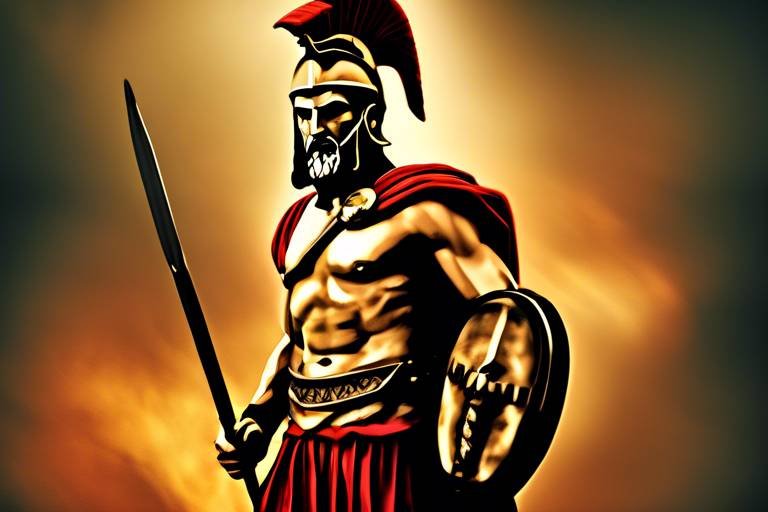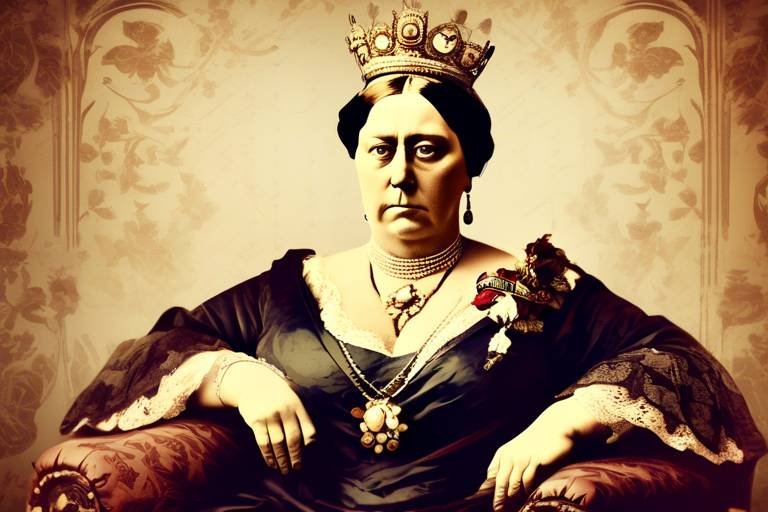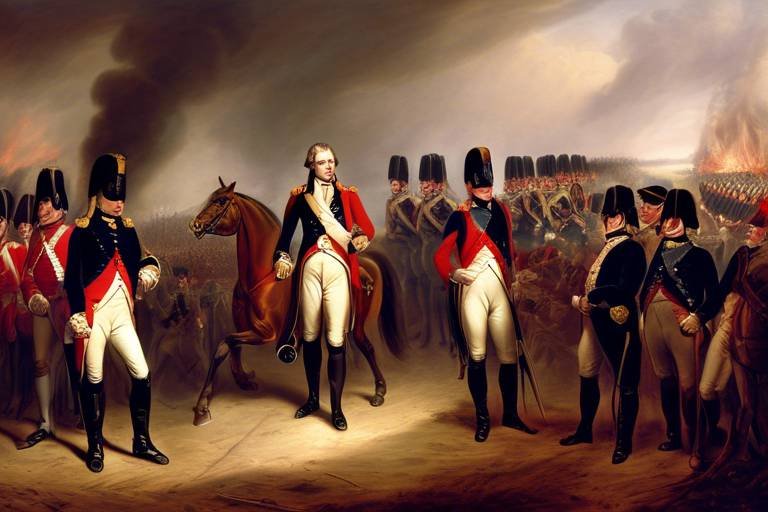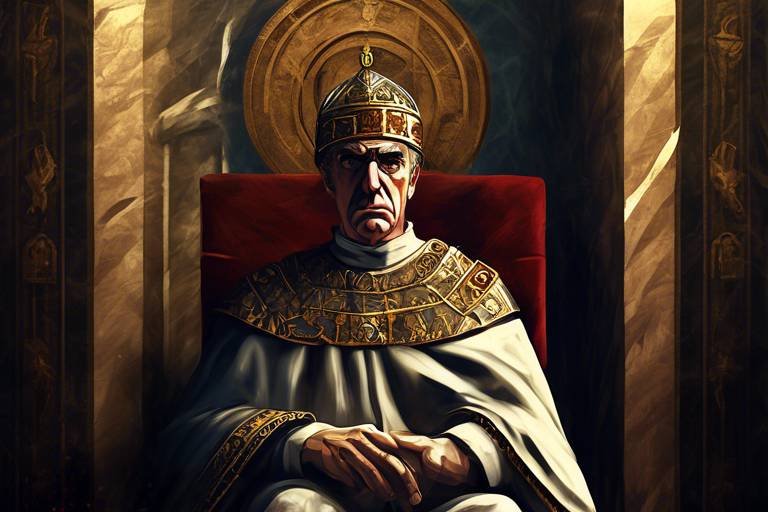Leonidas I: The Hero of Thermopylae
Leonidas I, the Hero of Thermopylae, stands as a legendary figure in history, renowned for his unwavering bravery and exceptional leadership. His name echoes through the ages as a symbol of courage and defiance against overwhelming odds, leaving an indelible mark on the annals of warfare.
Born into the royal lineage of Sparta, Leonidas I was groomed from a young age for the rigors of military life. His upbringing instilled in him the values of discipline, honor, and sacrifice, shaping the core of his character that would define his reign as king.
Ascending to the throne of Sparta, Leonidas I faced the daunting task of leading his people in a time of great peril. The looming threat of the Persian Empire, under the command of Xerxes, cast a shadow of impending doom over Greece, prompting Leonidas to take a stand that would etch his name in history.
The Battle of Thermopylae emerged as a pivotal moment in the clash of civilizations, where Leonidas I and his 300 Spartans stood as a bulwark against the tide of the Persian invasion. Their strategic positioning at the narrow pass showcased not only their military prowess but also their unwavering resolve in the face of insurmountable odds.
Leonidas I's leadership on the battlefield was marked by strategic acumen and unwavering courage. His ability to inspire his men to fight to the last breath, rallying the Greek forces to stand united against the Persian onslaught, exemplified his exceptional command skills and charismatic presence.
Following his valiant stand at Thermopylae, Leonidas I's legacy reverberated across the centuries, inspiring countless generations with tales of his heroism. The sacrifice of him and his men became a beacon of hope and defiance, fueling the flames of resistance against tyranny and oppression.
Despite the ultimate sacrifice made by Leonidas I and his Spartans, their memory lives on in the annals of history. Memorials and monuments dedicated to their valor serve as a testament to their enduring legacy, reminding future generations of the price paid for freedom and the power of unwavering resolve.
Separating myth from reality, the true essence of Leonidas I's leadership and the Battle of Thermopylae emerges as a testament to the human spirit's capacity for bravery and sacrifice. Through the lens of history, we glimpse the man behind the legend, a leader whose name will forever be synonymous with courage in the face of adversity.
As we reflect on the life and legacy of Leonidas I, the Hero of Thermopylae, we are reminded of the timeless values he embodied – valor, honor, and sacrifice. His story continues to captivate hearts and minds, serving as a beacon of inspiration for all who dare to stand against the forces of tyranny and oppression.

Early Life and Ascension to the Throne
Leonidas I, the legendary Spartan king, is remembered for his heroic stand against the Persian Empire at the Battle of Thermopylae. His leadership, bravery, and unwavering determination have left an indelible mark on history, inspiring generations with his sacrifice and valor.
Leonidas I's journey to becoming the king of Sparta was shaped by his early life and rigorous training in the Spartan military. Born into the royal Agiad line, Leonidas underwent the demanding agoge education system, where he honed his skills in combat, leadership, and discipline. His ascension to the throne came after the death of his half-brother, King Cleomenes I, propelling him into a position of power and responsibility.
As a young prince, Leonidas demonstrated exceptional prowess in military strategy and combat, earning the respect of his peers and elders. His upbringing instilled in him the values of honor, duty, and loyalty to Sparta, laying the foundation for his future leadership style characterized by strength, resilience, and unwavering dedication to his people.
Upon assuming the throne, Leonidas I faced the daunting task of leading Sparta during a tumultuous period marked by external threats and internal challenges. His reign was defined by his commitment to upholding Spartan traditions, fostering military excellence, and safeguarding the interests of his city-state. Leonidas's early experiences and upbringing played a pivotal role in shaping his character as a noble and courageous leader, setting the stage for his legendary stand at Thermopylae.

The Battle of Thermopylae
The Battle of Thermopylae stands as a monumental clash in ancient history, where the fate of empires hung in the balance. Leonidas I, with his 300 Spartan warriors, faced the mighty Persian army led by Xerxes in a narrow pass known as Thermopylae. This location proved crucial, as it nullified the numerical advantage of the Persians, allowing the Greeks to hold their ground with unmatched valor and tenacity. The strategic brilliance of Leonidas in choosing this battlefield showcased not only his military acumen but also his understanding of the terrain and its advantages in combat.
As the battle raged on, the Spartans, along with their Greek allies, displayed unwavering courage and discipline, forming a formidable shield wall that withstood wave after wave of Persian attacks. Despite overwhelming odds, they fought with a ferocity and determination that became the stuff of legends. Leonidas, leading from the front, inspired his men to fight with all their might, instilling in them a sense of duty and honor that transcended fear and uncertainty.
The sacrifice of Leonidas and his warriors at Thermopylae symbolized the epitome of selfless devotion to a cause greater than oneself. Their stand not only delayed the Persian advance but also served as a beacon of hope for the Greek city-states, rallying them to unite against the common threat. The legacy of this heroic last stand reverberated through the annals of history, inspiring future generations to emulate the courage and resilience displayed by Leonidas and his comrades in the face of overwhelming adversity.
The Battle of Thermopylae, though ultimately ending in defeat for the Greeks, left an indelible mark on the collective memory of mankind. It became a testament to the power of will and determination, illustrating that even in the face of insurmountable odds, a few brave souls can ignite a spark that lights the flames of freedom and resistance. The valor displayed by Leonidas and his Spartans continues to captivate the imagination of people worldwide, serving as a reminder of the enduring spirit of heroism and sacrifice.

Leadership and Strategy
When it comes to leadership and strategy, Leonidas I exemplified the qualities of a true military commander. His approach to leading the Spartan forces at Thermopylae was a masterclass in tactical decision-making and bravery. Leonidas understood the importance of inspiring his men, instilling in them a sense of duty and honor that transcended the fear of facing a much larger enemy.
One key aspect of Leonidas' strategy was his meticulous planning and positioning of his troops at the narrow pass of Thermopylae. By utilizing the natural terrain to his advantage, he was able to bottleneck the Persian forces, nullifying their numerical superiority. This strategic decision not only showcased his military acumen but also demonstrated his ability to adapt to challenging circumstances.
Moreover, Leonidas' leadership style was built on leading by example. He fought alongside his men on the front lines, showing them that he was willing to make the ultimate sacrifice for the greater good. This hands-on approach fostered a deep sense of camaraderie and loyalty among the Spartan ranks, creating a formidable fighting force that stood united in the face of overwhelming odds.
Throughout the Battle of Thermopylae, Leonidas I displayed unwavering courage and determination, inspiring his troops to hold their ground against the relentless Persian assaults. His ability to remain calm under pressure, make quick decisions, and maintain the morale of his men in the direst of situations set him apart as a true leader on the battlefield.
Overall, Leonidas I's leadership and strategy at Thermopylae serve as a timeless example of effective military command and the enduring legacy of a hero who led his men with honor and valor in the face of adversity.

Legacy and Historical Impact
Leonidas I's stand at Thermopylae left an indelible mark on history, transcending the battlefield to become a symbol of valor and defiance. His unwavering courage in the face of overwhelming odds resonates through the annals of time, inspiring generations with the spirit of selfless sacrifice and steadfast determination. The legacy of Leonidas I extends far beyond his mortal existence, shaping the very essence of heroism and resilience.
Historically, the Battle of Thermopylae served as a turning point in the Greco-Persian Wars, showcasing the power of unity and strategic defense against a formidable foe. Leonidas I's leadership exemplified the epitome of Spartan military prowess, instilling a sense of pride and honor in his warriors that reverberates through the ages. His tactical acumen and unyielding resolve have become legendary, immortalized in countless tales of bravery and valor.
Moreover, Leonidas I's stand at Thermopylae inspired a wave of artistic and literary creations, fueling the imagination of poets, playwrights, and historians alike. The epic tale of the 300 Spartans who defied the Persian juggernaut has captured the hearts of audiences worldwide, serving as a timeless reminder of the triumph of the human spirit against tyranny and oppression.
The historical impact of Leonidas I's sacrifice reverberates through modern military doctrine, influencing strategic thinking and operational tactics. His legacy continues to shape the ethos of courage and leadership, serving as a beacon of hope for those faced with insurmountable challenges. The heroism displayed at Thermopylae stands as a testament to the enduring power of conviction and the resilience of the human soul.

Death and Aftermath
After leading his 300 Spartans in the heroic defense at Thermopylae, King Leonidas I met his end in the midst of battle. Despite their unparalleled bravery and unwavering resolve, the Greek forces, including Leonidas, ultimately succumbed to the overwhelming numbers of the Persian army led by Xerxes. The death of Leonidas marked a significant loss for Sparta and the Greek city-states, as they mourned the sacrifice of their valiant warriors.
The aftermath of the Battle of Thermopylae reverberated throughout ancient Greece, sparking a renewed sense of unity and defiance among the Greek city-states. The sacrifice of Leonidas and his men served as a rallying cry for the Greeks, galvanizing them to continue the fight against the Persian invaders. The legacy of Leonidas' stand at Thermopylae endured as a symbol of courage and resistance against tyranny, inspiring future generations to uphold the values of honor and valor.
While the death of Leonidas marked the end of his physical presence, his spirit lived on in the hearts of the Greek people. The memory of his leadership and sacrifice continued to fuel the Greek resistance against the Persian Empire, culminating in decisive victories that reshaped the course of history. The legacy of Leonidas I transcended his mortal demise, becoming immortalized in the annals of Greek heroism and inspiring countless tales of bravery and defiance.

Myth and Reality
Myth and reality often intertwine when it comes to historical figures like Leonidas I and events like the Battle of Thermopylae. Countless tales and legends have been spun around the Spartan king and his heroic stand, blurring the lines between fact and fiction. One prevalent myth is the idea of Leonidas as an invincible warrior, a superhuman figure capable of single-handedly taking on the Persian army. While Leonidas was undoubtedly a skilled and courageous leader, he was not immune to defeat or death. The reality is that he faced overwhelming odds at Thermopylae and ultimately sacrificed himself for the greater good.
Another myth surrounding Leonidas is the portrayal of the 300 Spartans as the sole defenders of Greece against the Persians. In truth, Leonidas was accompanied by a larger force of Greek allies, including soldiers from other city-states. While the Spartans played a crucial role in the battle, it was a collective effort by all Greek forces involved. Separating myth from reality allows us to appreciate the true complexity of the historical events and the contributions of all those who fought at Thermopylae.
Legends also depict Leonidas as an infallible leader, always making the right decisions and never wavering in the face of danger. However, historical accounts suggest that Leonidas, like any leader, faced challenges and uncertainties during the battle. His strategic choices, such as the decision to remain at Thermopylae despite the Persian advance, were not without risks and criticisms. By examining the reality of Leonidas's leadership, we gain a deeper understanding of his humanity and the complexities of wartime decision-making.
Separating myth from reality in the context of Leonidas I and the Battle of Thermopylae is essential for appreciating the true historical significance of these events. While myths and legends add layers of intrigue and inspiration, they can also distort our understanding of the past. By critically analyzing the stories surrounding Leonidas and his stand at Thermopylae, we can uncover the enduring lessons of courage, sacrifice, and leadership that continue to resonate today.

Memorials and Commemorations
Memorials and commemorations dedicated to Leonidas I and the brave Spartans who stood with him at Thermopylae serve as enduring reminders of their valor and sacrifice. One of the most famous tributes is the Leonidas Monument in Thermopylae, marking the exact location of the battle and honoring the Spartan king and his men. The monument stands as a symbol of defiance and courage in the face of overwhelming odds, inspiring visitors from around the world with its powerful presence.
Additionally, in Sparta, the Leonidas Statue stands tall, depicting the king in his full warrior regalia, a testament to his leadership and unwavering resolve. Tourists and history enthusiasts often visit this statue to pay their respects and learn more about the legendary king who etched his name in history through his actions at Thermopylae.
Various museums across Greece house artifacts and exhibits dedicated to Leonidas I and the Battle of Thermopylae, showcasing weapons, armor, and historical documents that provide insights into the events of that fateful battle. These museums not only educate visitors about the past but also keep the memory of Leonidas and his Spartans alive for future generations to appreciate.
Moreover, annual commemorative events are held at Thermopylae to honor the legacy of Leonidas I and the 300 Spartans. These events include reenactments of the battle, educational seminars, and cultural performances that pay tribute to the heroism displayed by the defenders of Greece. Such gatherings serve as a way to keep the spirit of bravery and sacrifice alive in the hearts of people and ensure that the story of Thermopylae is never forgotten.
Frequently Asked Questions
- Who was Leonidas I?
Leonidas I was the king of Sparta who famously led the Spartan forces in the Battle of Thermopylae against the Persian Empire.
- What is the significance of the Battle of Thermopylae?
The Battle of Thermopylae is renowned for the valiant stand made by Leonidas I and his 300 Spartans against the much larger Persian army, showcasing courage and determination in the face of overwhelming odds.
- How did Leonidas I's leadership impact history?
Leonidas I's leadership at Thermopylae became a symbol of resistance and inspired future military tactics, art, and literature, leaving a lasting legacy in the concept of heroism.
- What is the legacy of Leonidas I and the Spartans at Thermopylae?
The legacy of Leonidas I and the Spartans at Thermopylae is commemorated through various memorials and monuments, honoring their sacrifice and bravery in defending Greece against the Persian invasion.



















